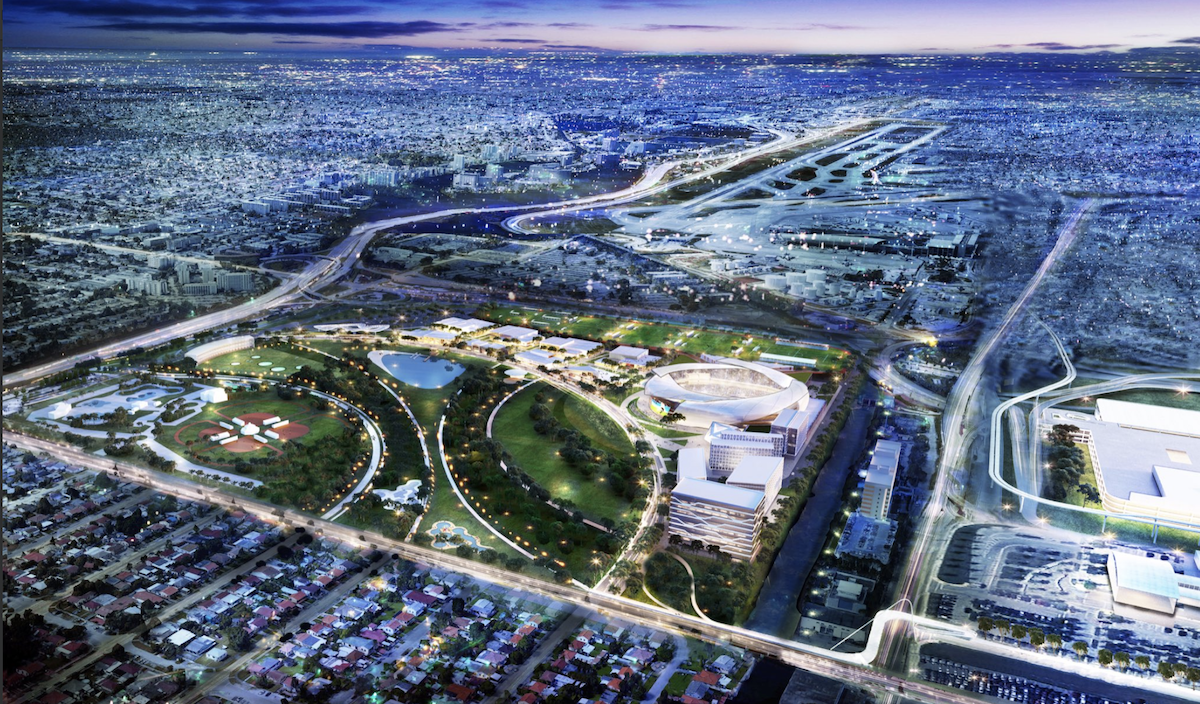
Jorge Mas’ Twitter

Audio By Carbonatix
For the last 24 hours, Miami officials have been furiously pushing the latest pitch from David Beckham and financier Jorge Mas for a new soccer stadium at Melreese Country Club, largely by insisting the deal would pour millions into city coffers. City Manager Emilio Gonzalez repeatedly estimated that $44 million per year in new taxes could result, prompting reporters to ask: Where the hell are those numbers coming from?
The city has now released a spreadsheet detailing exactly how much money Mas and Becks are promising from their Major League Soccer stadium built on public land. And, in news that should surprise no one who has ever followed a stadium push, the economic figures are almost certainly nonsense.
Nearly half of Gonzalez’s tax promise – a full $21.2 million of that $44 million annual tax projection – is supposed to come via sales tax at the complex, which would include a hotel, office space, public park, golf-entertainment facility, and 600,000 square feet of new retail space in addition to the stadium.
That retail space is key: Of that $21 million, $14.1 million is projected from those retail slots. But here’s the thing: The Mas/Beckham group currently has no actual vendors signed up to fill that space. So they’re just guessing that businesses will fill those empty storefronts and feed $14 million in tax revenue per year – no small chunk of change – back to the city. A full quarter of the entire projected economic benefit for the project comes from these hypothetical businesses.
Eugene Ramirez, a spokesperson for the city, confirmed to New Times that the government only received a hard copy of the spreadsheet today – which means Gonzalez cited that $44 million figure yesterday without having a physical copy of the exact Mas/Beckham economic breakdown. Gonzalez had instead just verbally discussed the figures with the Mas group before parroting those numbers in the press. Jesse Manzano-Plaza, a spokesperson for the Beckham group, said he could not immediately respond to questions about the figures.
Ahead of critical commish vote Thurs, #Miami City mgr @emiliotgonzalez says, by the numbers, Beckham / Mas plan for MLS soccer complex on Mel Reese golf property “..makes sense on a business level…and cultural level…”
More here@WPLGLocal10 pic.twitter.com/yZHYYmkuFH— Glenna Milberg (@GlennaOn10) July 9, 2018
While some criticisms of the MLS plan seem like nonsense – it is, for example, ludicrous to claim the Melreese Park golf course, a water-sucking environmental
And it’s worth noting that impact guesses like this have not turned out well for Miami residents in the past. There’s a reason mentioning the Marlins Park debacle gives many locals post-traumatic-stress episodes. Infamously, Marlins Park (which, to be fair to Beckham and Mas, was pitched far more fraudulently) was built with the expectation that new businesses would spring up nearby. Seven years later, that has not happened.
More to the point: The Marlins Park garages included retail space that bears striking resemblance to the sort of business storefronts the Beckham group is proposing. And that shopping center is, to be kind, struggling: Miami Today reported in February that, after seven seasons, the garage shopping complex is only at 75 percent retail occupancy. The businesses there include a brewery, a cigar shop, a Subway sandwich chain, and a kidney dialysis center, among others. Other businesses have fallen through: A restaurant named Cafe Rubio started remodeling one of the storefronts before abandoning the project.
It’s hard to imagine that lineup of stores is pumping $10 million in sales-tax revenue back into city coffers. More important, Marlins Park sits in urban Little Havana, a prime business location that theoretically shouldn’t struggle for tenants. Demand for stores in Doral next to a soccer stadium would not seem to be astronomically better.
Lastly, there’s ample evidence that stadium deals don’t actually create new economic benefits for cities and towns, but instead siphon money away from other sources. This was discussed repeatedly during the Marlins Park fiasco, but money-blinded public officials did not seem to listen or care.
Beckham soccer and commercial complex would generate at least $385M in taxable revenue from operations each year. That means sales of more than $1 million per day. $256M from the mall, and $42M from the stadium. Shows why commercial complex is so vital for the deal
— Doug Hanks (@doug_hanks) July 10, 2018
Economists who study this phenomenon note that local residents have only a set amount of money to spend on entertainment: Numerous sports-economics studies suggest residents tend to simply shift their expenditures from things like movies, zoo tickets, or bowling alleys toward others like sports tickets or overpriced beers. New stores don’t inherently create new sources of tax wealth for a city or town – often, sales tax generated at one store or stadium is pulled from sales tax somewhere else.
Robert Baade, a Lake Forest University sports-economics professor, criticized the city of Nashville in 2017 for failing to account for this phenomenon in its economic projections for a proposed MLS site. Baade analyzed Nashville’s plan and warned that project might wind up sucking so much sales tax money away from the city that public officials might be laid off.
Let’s hope the same isn’t true here.